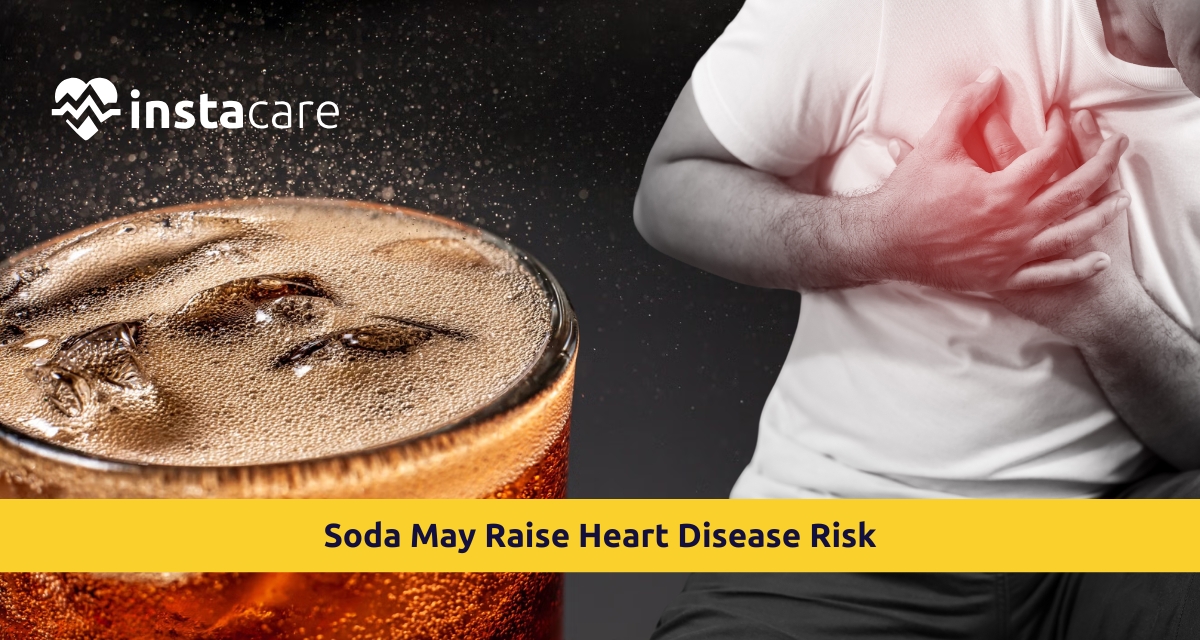Recent years have seen more attention placed on how sugary drinks affect the cardiovascular health of patients. Though everyone, every now and then, does have that little dessert, drinking soda has been linked to increased heart disease when consumed excessively. This essay delves into why perhaps soda is a more detrimental contributor to heart disease than just an occasional indulgence in sweets. The article seeks to research its findings, health effects, practical advice on healthier choices, and wider dietary lifestyle.
Knowing the Dangers of Soda Consumption
It contains a lot of sugar and empty calories and has become
part and parcel of many diets. Added sugars, mainly high-fructose corn syrup
and sucrose, account for most carbonated beverages. These sugars have been
demonstrated to cause problems in the body in the following ways:
1. Caloric Intake
Sodas are calorie-containing beverages with no nutritional
value. For instance, a typical can of soda, 12 ounces contains approximately
150 calories, all from sugar. Consuming more calories in drinks leads to weight
gain and weight gain leads to a new risk factor for heart disease. Many years
of being overweight dumped on the body become a cause of hypertension, increase of
cholesterol, and diabetes as risk factors of heart diseases.
2. High Blood Sugar Levels
The sugars in soda rapidly elevate blood glucose. Continued
consumption of sugar-containing beverages leads to insulin resistance, which is
a condition leading up to type 2 diabetes. It has been documented that diabetic
patients are many times more likely to suffer from heart disease. According to
a study conducted in the Journal of the American College of Cardiology, those
who consume sugar-sweetened drinks have a much greater chance of suffering from
cardiovascular diseases than those people who have them less often.
3. Inflammation and Blood Vessel Damage
Scientific research has demonstrated the cause of
inflammation in the human body through high sugar consumption. Heart diseases
are mainly caused by chronic inflammation. Have soda, which acts as a sugary
beverage that causes stiffening blood vessels. A systematic review in
Circulation further claimed that every additional serving of sugar-sweetened
beverages augments the risk of heart disease at 10-20 %.
4. Effect on Lipid Profiles
According to research, regular soda consumption frequently
has a relationship with low lipid profiles, such as triglyceride levels far
above the threshold and HDL, often called "good" cholesterol, below
their normal threshold levels. Increased risk of heart attack, stroke, which
causes thrombosis with obstruction from plaque in the vessels: an American
Heart Association note. High triglycerides top the list of major contributors
of this disease.
Sweet Desserts Vs Soda
Both soda and sweet desserts like cakes and candies contain
sugar; however, they are consumed differently, leading to very different health
effects. The following differences are the most important:-
Rate of Intake
People drink soda every day, but sweets are drunk less
often. The frequent drinking sums up to lead to health problems as a result of
soda drinking. For instance, one drinks several sodas without knowing how much
sugar the body is assimilating compared to a slice of cake that may be drunk
once in months.
Nutritional Value
These can be some nutritious sweet treats when the
ingredients are whole (like fiber, vitamins). On the other hand, soda
contributes very little to no nutritional value. The empty calories from sweet
beverages may replace better choices and over time cause nutrient deficiencies.
Portion Control
This makes it more likely to consume too many calories from
soda because it is high-volume consumption in large sizes, such as 16 oz or
bigger. In contrast, sweets are usually consumed in small portions. For
example, the calories in a cookie or slice of cake are fixed in quantity, but
one 16-ounce serving of soda might be twice or three times that many calories.
View More: Types of Heart Tests An A-Z Guide for You
The Overall Picture of Eating Habits
The risks associated with soda consumption require a broader
perspective of the dietary habits in society. Modern diets, especially in the
Western world, have consisted of a higher proportion of processed foods and
sugary beverages, which has been responsible for most health issues:
1. Processed Foods:
Most added sugars, unhealthy fats, and preservatives can be
found in processed foods. It's easy to find most people convenient ways of
eating them which leads to over-calorie intake, deficient nutrients, and
eventually, consuming soda with them.
2. Marketing and Accessibility
There is aggressive advertisement of soda that targets young
generation children and adolescents. Its availability at schools, restaurants,
and small-scale retailers makes it easy enough for the consumers to take their
sugary drinks quite regularly. The dangers that lie within sugar-based
confections most of the times silence the education, and hazards behind
consumption of soda are scarcely tackled.
3. Cultural Norms
Soda is the most normal drink during parties, celebrations,
and even meals in many cultures. Due to this normality in cultures, people
might be inclined to overlook the risk associated with drinking it daily.
Tips for Healthy Intake
To minimize your chances of getting heart disease and
indulge in the sweet flavor without posing harm to yourself, consider the
following tips:
1. Limit Intake of Soda
Limit soda consumption only for special occasions. Instead,
switch sugary drinks to water, herbal teas, or flavored sparkling water to not
just reduce sugar but hydrate better as well.
2. Reading Labels
Be aware of how much sugar is in your drinks. Choose low
sugar drinks or those that are sweetened with natural sweeteners such as stevia
or monk fruit. Many brands also offer "zero" or "diet"
varieties. Be wary, though, as artificial sweeteners have their own health
implications.
3. Whole Foods
Try using whole fruits instead of those sugary sweets. These
have natural sugars along with fiber, vitamins, and minerals to do wonders to
the heart. Making healthy snacks out of whole foods also helps in filling up
the craving of something sweet without using sugars present in commercial
products.
4. Learn
You should know what you eat and its nutritional values so
that you may be able to make health decisions for your heart. Knowing what you
are in relation to calories and sugar can very much help in having a healthy
lifestyle.
5. Maintaining Activity
Incorporate regular physical activity into your lifestyle,
and you'll find that it will indeed help you to keep your weight in check and
basically maintain your cardiovascular health. Good ways to keep your heart in
shape include walking, cycling, or even a fitness class.
Conclusion
Obviously, proof exists that the intake of soda is more
dangerous to heart conditions than indulging once in a while in some sweets. It
is done due to awareness of what would happen if sweet drinks were taken and
also proper intake in terms of dietary measures. This is the only way to bring
down risks in a condition such as heart disease much. Better dietary habits,
coupled with moderation, contribute to healthy well-balanced diets, bringing
well-being.
Please book an appointment with the best Cardiologist in Lahore, Karachi, Islamabad, and all major cities of Pakistan through Instacare, or call our helpline at 03171777509 to find a verified doctor for your disease.











